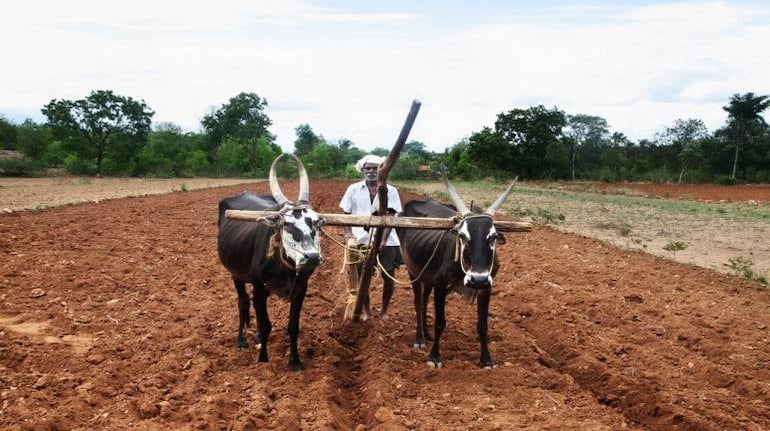



Ruchi Agrawal
Moneycontrol Research
Long gone are the days when weather conditions and soil requirement were the primary factors determining cropping patterns and choice of crop. Cropping pattern is greatly influenced by government policies and assurance of procurement, which in turn are more populist in nature than efficiency-oriented.
The promise of a higher MSP (minimum support price) can further perpetuate this trend. If policy makers do not attempt to correct this gross misallocation of resources, Indian agriculture stands to suffer.
Faulty policies, distortionary subsidies and unsustainable resource allocation leads to concentration of crops in areas that are principally not best-suited from the input cost and resource utilisation point of view. Development of industrial belts in such regions, along with populist support policies from the government, leads to further promotion of such misallocated crops.
Classic examples of such misallocation are the overproduction of water-intensive crops like sugarcane and rice in states like Maharashtra and Punjab, where a depleting water table and unevenly-distributed monsoons have been causes of concern. Despite the inefficient use of water resources in these states and low crop yield per liter of water, these crops continue to remain the top choice of farmers, leading to overproduction and a worsening imbalance.
Supported by disproportional allocation of water resources (100 percent irrigation cover for sugarcane) along with the sugar producing industrial belt in the state and assured markets, sugarcane farmers tend to remain sticky in Maharashtra, despite the climatic suitability and higher value output of other crops like cotton and pulses that have only 3 percent irrigation cover.

Irrigation support and provision for free power, coupled with assured procurement of produce at predetermined prices, makes farmers in Punjab stick to rice cultivation even in the face of depleting water tables and increased concern on air quality depletion due to stubble burning in the state.
Production of rice per liter of water in Punjab remains significantly lower than that in eastern states like West Bengal and Bihar, where water availability is better and the same amount of crop can be grown using lesser irrigation and power.

Consequences of misallocation
Skewed allocation of resources disturbs the natural balance, which leads to disproportionate and inefficient utilisation of inputs like water and lowers per-unit productivity. In a country like India, which has a rapidly-increasing population and limited availability of resources, this is an issue that cannot be neglected for long.
Abundant output also leads to falling prices in the domestic market, which warrants higher support prices and increases the subsidy burden for the government. Moreover, subsidies on inputs like power, rather than direct transfers to farmers, also lead to lower input costs for the farmers, which in turn leads to lower procurement prices (procurement price is linked to input costs) and returns for farmers.
With limited availability of land, abundance of certain crops results in a high opportunity cost. Farmers are, in reality, diverting land from some other crops, which might have added higher value. The unavailability of these crops, which may be in great demand, might increase pressure on imports and foreign exchange reserves to meet domestic demand.
How the misdirected policy displaces natural adjustment
With such interfering government policies, free market forces are not allowed to play and a controlled mechanism enters the system that prohibits free adjustment of production and selection of crops. Since general demand-supply dynamics are not allowed to play out, it stands in the way of allocative efficiency. The farmer tends to remain committed to crops for which government support is high or for which sale is assured.
This results in continued overproduction of certain crops and lingering scarcity of certain others, and the switch between crops is hindered. Despite climatic non-suitability, certain crops are concentrated in certain regions only due to economic support and ready access to industries. This results in inefficient utilisation of both input resources as well as government subsidy.
Call of the hour
Instead of resorting to distortionary populist subsidies and support, the Centre and states should invest in building up the procurement market and appropriate storage infrastructure, along with adequate logistic facilities. They should deregulate primary wholesale markets and introduce measures to promote industries in right regional centers.
Moreover, provision of direct support to farmers, rather than free inputs, remains a better alternative and would help ensure better returns, improved agriculture income, and a more efficient use of available inputs.
Populist support measures are only a short-term solution and aggravate the imbalance in resource allocation.
For more research articles, visit our Moneycontrol Research Page.
Discover the latest Business News, Sensex, and Nifty updates. Obtain Personal Finance insights, tax queries, and expert opinions on Moneycontrol or download the Moneycontrol App to stay updated!
Find the best of Al News in one place, specially curated for you every weekend.
Stay on top of the latest tech trends and biggest startup news.